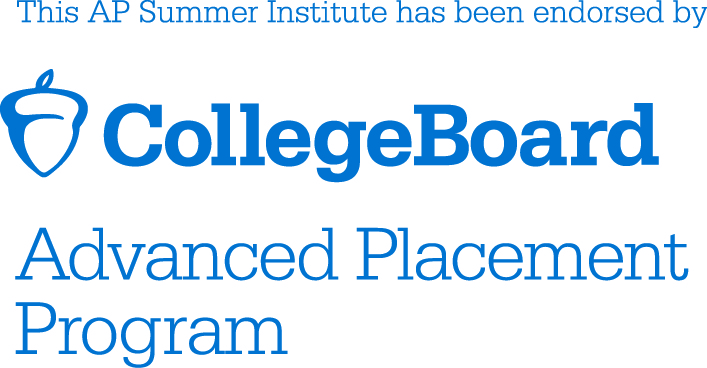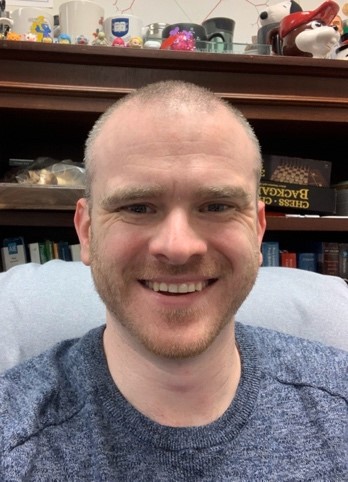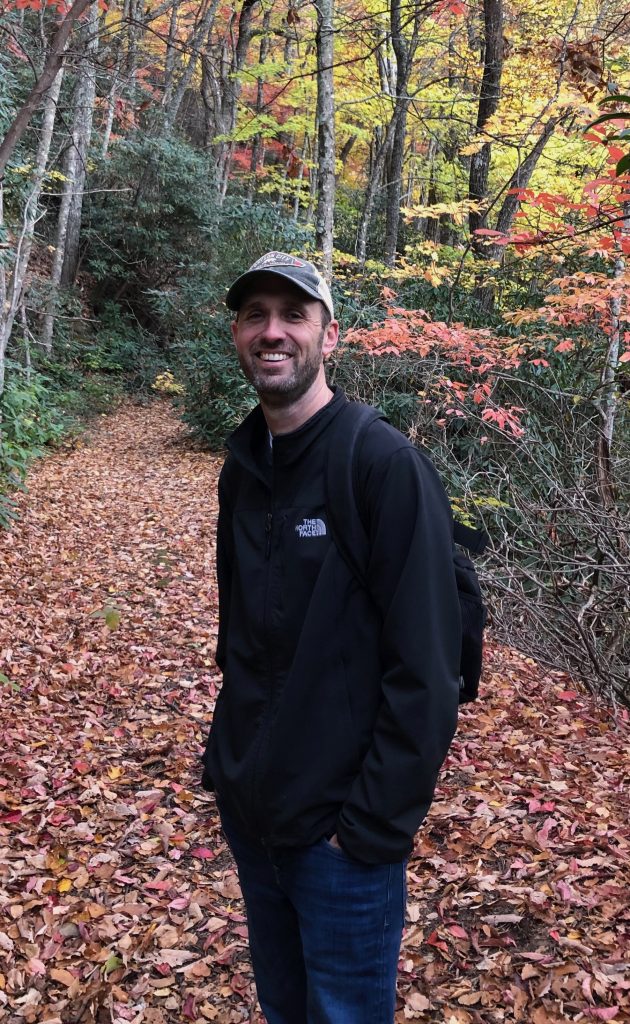
Advanced Placement Summer Institute
June 29 – July 2 and July 13-16, 2026
The University of Alabama is pleased to partner with the College Board® to offer the Advanced Placement (AP) Institute for current AP teachers who are looking to strengthen their program or teachers who are new to the AP program seeking guidance on curriculum and teaching methods.
Overview
The University of Alabama is pleased to partner with the College Board® to offer the Advanced Placement (AP) Institute for current AP teachers looking to strengthen their programs or for new AP teachers seeking guidance on curriculum and teaching methods. The topics included in these workshops are subject matter content, test construction, pupil and teacher selection, College Board policies and procedures, and preparation and grading of AP tests.
The 2026 University of Alabama AP Summer Institute will offer new AP workshops for teachers with no or minimal AP training and Experienced teacher workshops for teachers who have previously attended a workshop or training session or who have taught an AP course for at least 2 years.

| Available Dates | June 29 – July 2 and July 13-16, 2026 |
| Grants | Refer to your confirmation letter upon registration for the exact locations of courses. |
| Location | Refer to your confirmation letter upon registration for exact locations of courses. |
| Lodging | Hotel Capstone 320 Paul W Bryant Dr, Tuscaloosa, AL 35401 205-752-3200 |
Who Should Attend

Advanced Institutes – Experienced AP Teachers
The Advanced Institute is designed for experienced teachers who have taught Advanced Placement for at least two years. This seminar introduces new subject matter while placing a strong emphasis on practical teaching skills that participants can take back to their existing AP programs.
Introductory Institutes – New AP Teachers
Teachers with minimal or no training in Advanced Placement curricula are encouraged to attend the introductory institutes. Topics covered include subject matter content, test construction, pupil and teacher selection, College Board policies and procedures, and preparation and grading of AP tests.
Please note: All workshop offerings are contingent upon sufficient demand. Please register early to ensure that your preferred subject area is offered.
Continuing Education Units
For State of Alabama teachers ONLY:
- 30 hours of professional development will be awarded upon successful completion of the institute. Graduate credit is not an option for any subject.
- Participants will receive contact hour credit through the UA/UWA Regional In-service Center upon completion.
Teachers in all other states need to verify with their school system that our APSI’s CE Certificate qualifies as professional development credit.
Courses
Monday, June 29- Thursday, July 2, 2026
US Government and Politics
About the Course
Details about the course
About the Speaker
Session Bio
US History
.
About the Presenter
Mark LittleMark Little had been a science teacher at Broomfield High School in Colorado for 32 years and has taught AP Biology for about 20 years and retired at the end of 2018. He has been very involved with the AP Biology re-design, including and not limited to field-testing some of the laboratory investigations and helping with the new CED. Mark has been an AP Reader and Table Leader for over fifteen years at the reading along with being an item writer for the exam. Mark received his BS degree from Colorado State University and his Masters from the University of Denver.
Mark incorporates the new curriculum framework ideas in his workshop and his focus for his institutes is to help the AP Biology come alive for students He incorporates the information learned in his workshops and stays current using research-based, pedagogically sound instructional strategies. Mark is involved with the AP Biology Teacher community and offers help to teachers directly in these groups. Mark is a National Board Certified and has been recognized for his teaching by receiving various awards, including the Outstanding Biology Teacher Award for the state of Colorado in 2005. Since 2014, Mark has lead AP workshops in Alabama, Arizona, Minnesota, Montana and California. Mark was President of the National Association of Biology Teachers (NABT) in 2013 and currently still very involved with the organization. In 2024, he received NABT’s highest award, Honorary Membership by being recognized for his teaching, research, or service in the biological sciences. He enjoys reading, fly fishing and golfing and traveling with his wife in his free time.
World History: Modern
.
About the Presenter
Mark LittleMark Little had been a science teacher at Broomfield High School in Colorado for 32 years and has taught AP Biology for about 20 years and retired at the end of 2018. He has been very involved with the AP Biology re-design, including and not limited to field-testing some of the laboratory investigations and helping with the new CED. Mark has been an AP Reader and Table Leader for over fifteen years at the reading along with being an item writer for the exam. Mark received his BS degree from Colorado State University and his Masters from the University of Denver.
Mark incorporates the new curriculum framework ideas in his workshop and his focus for his institutes is to help the AP Biology come alive for students He incorporates the information learned in his workshops and stays current using research-based, pedagogically sound instructional strategies. Mark is involved with the AP Biology Teacher community and offers help to teachers directly in these groups. Mark is a National Board Certified and has been recognized for his teaching by receiving various awards, including the Outstanding Biology Teacher Award for the state of Colorado in 2005. Since 2014, Mark has lead AP workshops in Alabama, Arizona, Minnesota, Montana and California. Mark was President of the National Association of Biology Teachers (NABT) in 2013 and currently still very involved with the organization. In 2024, he received NABT’s highest award, Honorary Membership by being recognized for his teaching, research, or service in the biological sciences. He enjoys reading, fly fishing and golfing and traveling with his wife in his free time.
Macreconomics
.
r
Human Geography
.
About the Presenter
Precalculus (New & Experienced Teachers)
Seminar
.
About the Presenter
Seminar ELA
.
About the Presenter
Research
.
About the Presenter
Monday, July 13-16, 2026
Calculus
Course Description
Course Objectives
Learning Objectives: By the end of this workshop, participants will be able to
About the Presenter
David HornbeckDavid Hornbeck is a teacher and Math Team coach at Rockdale Magnet School for Science and Technology in Conyers, Georgia. He currently teaches Precalculus, AP Precalculus, and AP Statistics. He previously taught at Eastside High School in Covington, GA for 7 years. David is a member of the Georgia Council of Teachers of Mathematics (GCTM) and the Georgia Association of AP Mathematics Teachers (GAAPMT), which he serves on the board of. He was an AP Statistics exam reader from 2019-2023, but made the switch to Precalculus for the 2024 reading, where David was an early table leader. He has presented numerous sessions at the Georgia Mathematics Conference and is passionate about helping educators create their own lessons, assessments, and other materials that can engage their students in mathematical thinking and make mathematics come alive for them. David received the Teacher of Excellence Award from GCTM in 2023, is a recipient of two Yale Distinguished Educator awards, and has received the Georgia STAR award three times. In his free time, David enjoys spending time with his wife, MaryBeth, and his 3-year old son, Cedric. He also enjoys woodworking, playing guitar, and doing crossword puzzles.

Statistics
Course Description
Course Objectives
Learning Objectives: By the end of this workshop, participants will be able to
About the Presenter
English Language and Composition (New & Experienced Teachers)
About the Presenter
English Literature and Composition (New & Experienced Teachers)
Course Description
During this AP English Literature and Composition APSI, you’ll explore the course framework, the exam, and the new AP resources that will help you plan and focus instruction—and give you feedback throughout the year on the areas where individual students need additional focus. You’ll also learn about completing the digital activation process at the start of the school year that will give you immediate access to the new resources and will help ensure that your students can register for AP Exams by the new fall deadlines. By attending this APSI, you’ll gain deeper insight into the following key takeaways, among several others: Understand the Course; Plan the Course; Teach the Course; Assess Student Progress; and Engage as a Member of the AP Community. In addition, specific attention will be paid to the following AP Classroom resources: unit guides, personal progress checks, AP teacher community, and the AP question bank.
Course Overview and Objectives:
In this workshop, participants will learn the essentials for designing (or refining) an exciting, effective and joyful AP English Literature class. Over the course of four days, participants will accomplish the following actions:
- Use the AP® Course and Exam Description (CED) to create a compelling and creative syllabus
- Learn ways to make AP English Literature more equitable and accessible to all students
- Work on powerful strategies for helping students score well on all components on the AP® English Literature Exam: the Multiple Choice section, the Prose and Poetry Analysis Essays, and the Literary Argument (Q3) Essay.
- Evaluate sample student essays of all three types by application of the AP® Essay Analytic Rubric
- Become familiar with the features of AP® Central, AP® Classroom, Instructional Reports, and the AP®Community in order to improve and enrich instruction
- Discover ways to help students improve their writing skills—from writing effective thesis statements and establishing lines of reason to embedding well-chosen evidence into body paragraphs and writing powerful introductions and conclusions.
Course Agenda:
Day 1: Overview and Multiple Choice:
- Welcome and Introductions
- Making Classroom Structures
- Overview of the Week and Learning Objectives
- Overview of the AP English Literature Course and Exam
- Expanding AP Access and Equity
- Diving into the CED
- Syllabi Requirements and Sample Syllabi
- Using AP Classroom
- Multiple Choice Strategies
Day 2: Poetry—Units 2, 5, and 8
- What is Poetry?
- The Elements of Poetry
- Teaching to Analyze Poetry Effectively in both Formal and Informal Ways
- Creating Poetry
- Writing Focus: Effective Thesis Statements and Introductions; Establishing a Line of Reasoning
- The AP English Literature Essay Rubric for Poetry
- Scoring Sample Student Poetry Analysis Essays
Day 3: Prose—Units 1, 4, and 7
- What is Prose?
- The Elements of Prose
- Teaching Students to Analyze Prose Effectively
- Writing Focus: Developing Paragraphs, Embedding Quotations, Selecting Evidence
- The AP English Literature Essay Rubric for Prose
- Scoring Sample Student Prose Analysis Essays
Day 4: Major Works (Novels and Plays)—Units 3, 6, and 9. Final Reflections
- Course Evaluations
- What is Q3?
- Ways to Prepare Students for Q3
- Writing Focus: Earning the Sophistication Point, Ways to Structure Essays, Writing Effective Conclusions
- The AP English Literature Essay Rubric for Q3
- Scoring Sample Student Q3 Essays
- Using Instructional Reports to Guide Future Instruction
- Creating a Joyful Classroom Environment
- Syllabus Planning Time
- Assess and Reflect
About the Presenter
Davis ThompsonDavis Thompson has been teaching AP English Literature and Composition at Auburn High School in Auburn, Alabama for the past twenty-six years, and he has loved every minute of it. His greatest passion is teaching students both how to analyze and how to enjoy poetry. Davis has been the coach and sponsor for Poetry Out Loud (a national poetry recitation contest) at his school for the past thirteen years and has helped his students win the Alabama State Championship five times, 3rd place in the nation one time, and the National Poetry Out Loud Championship itself in 2011. Davis also has had experience through NEH Institutes studying Shakespeare both as an actor and teacher as well as dabbling in some philosophy. In addition to AP English Literature, he has taught IB English Literature, IB Theory of Knowledge, and Creative Writing. Davis holds a B.A. in English from Furman University (1996) and a M.A. in English Education from Auburn University (1997). He works as a College Board Consultant and AP Reader for AP English Literature. When asked by students, “Why do we have to read this?” Davis has a simple one word answer (that is also his life philosophy): “Joy.”

Computer Science A
Course Description
About the Presenter
Computer Science Principles
Course Description
About the Presenter
Course Location and Lodging
Refer to your confirmation letter upon registration for the exact location of courses.
A room block rate has been arranged with Hotel Capstone for those attending the in person APSI courses. Hotel Capstone is conveniently located just a short walk across the courtyard from the Bryant Conference Center.
Directions
Hotel Accommodations
| Hotel | Hotel Capstone 320 Paul W Bryant Dr, Tuscaloosa, AL 35401 205-752-3200 |
| Distance from courses | On campus within walking distance from the Bryant Conference Center |
| Room Block Dates | June 29 – July 2, 2026 July 13-16, 2026 |
Reserve Your Room
- Select the dates of your APSI course below to start your reservation:
- Select the corresponding check-in and check-out dates to complete your reservation and receive your confirmation number.
- Rooms requested outside the room block dates are subject to availability and the prevailing rate. These can be booked by calling 205-752-3200. Ask for the Advanced Placement Summer Institute block with the corresponding dates listed above.
- Room blocks will drop at midnight 30 days before the event start date.
- NOTE: Only the dates above and the contracted room types are available at the contracted rate — rooms requested outside your block dates or different room types are subject to availability and the prevailing rate.
Registration
Register Online:
US Government and Politics, US History, World History: Modern, Macroeconomics, Human Geography, Precalculus, Research, Seminar, and Seminar for ELA
Calculus AB, Statistics, Computer Science A, Computer Science Principles, English Language and Composition, English Literature and Composition
Registration Fees
The early bird registration fee for Advanced Placement Summer Institute sessions is $750. Late registration goes up by $50 one month before the institute. Your tuition covers 30 hours of professional development, College Board AP materials, subject-related sample textbooks, a light breakfast, snacks, drinks, and lunch.
| Session | Fee |
|---|---|
| Standard Advanced Placement Summer Institute sessions | $750/$800 *$50 increase one month before training |
| Capstone Courses (AP Seminar and AP Research) | $1,075 |
Capstone Courses (AP Seminar and AP Research) registration fee is $1,075. Capstone Course tuition covers 4.5 days of training, College Board materials, a light breakfast, snacks, drinks, and lunch.
Lodging is the responsibility of the attendee.
All Registrations must be made in Cvent
Registration will be through the College Board CVENT system by clicking the appropriate link above. All AP teachers and Coordinators will register through this system using their College Board EPL logins. If you do not have an account with the College Board, then you may create an account when entering the system. You will see the payment instructions for POs and checks in the Cvent registration portal.
Billing Policy
For your registration to be complete, payment must be received with the registration. We accept checks, purchase orders, and credit cards. Registrations received without payment will not be accepted. Checks should be made out to The University of Alabama.
Upon successful registration, a confirmation will be sent to the provided email address.
Special Accommodation Requests
The University of Alabama is committed to complying with the Americans with Disabilities Act. Requests for accommodation of physical and/or dietary needs should be made at least 30 calendar days prior to the program date. Please email your request to professionaldevelopment@ua.edu. A portion of the invoice amount for this program will go to the Capstone Lifelong Learning Foundation to support activities of The University of Alabama and the Office of Teaching Innovation and Digital Education.
Need our STAARS Vendor Number? Please use VC000118827 for UA Office of Teaching Innovation and Digital Education.
A portion of the invoice amount for this program will go to the Capstone Lifelong Learning Foundation to support activities of The University of Alabama and the Office of Teaching Innovation and Digital Education.
Cancellation Policy
A cancellation charge equal to 100% of the registration fee will be assessed for cancellations made within seven (7) days of the start of this session. Refunds will not be granted after the program has begun. The University of Alabama reserves the right to cancel, postpone, or combine class sections, to limit registration, or to change instructors. Contact the Registration Services department at 205-348-3000 or registration_services@ua.edu to cancel your registration. View the OTIDE Cancellation Policy.
Questions about the APSI?
For more information, contact APSI at 205-348-4440 or apsi@ua.edu.
Registration Services contact information:
The University of Alabama
ATTN: Registration Services
Box 870388
Tuscaloosa, AL 35487-0398
Phone: 205-348-3000